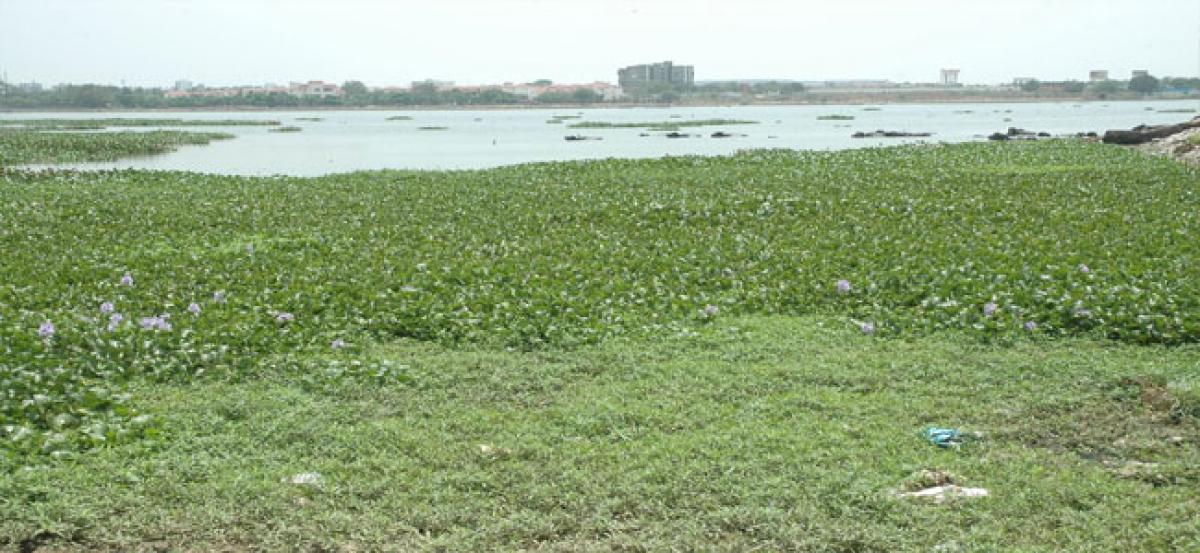Live
- Will gift one project daily to people during Jan Kalyan Parv
- Mahakumbh & the Politics of Sanatan Nationalism
- A Soulful Celebration of Global Music
- Brahmin Community delegation felicitates CM Saini
- Allu Arjun Visits Chiranjeevi’s House for Lunch Meet
- Toyota organising TG Grameena Mahotsav
- Special rituals conducted at Maramma Temple
- Siddaramaiah has special love for Muslims: BJP
- We can’t afford spending less than 6% of GDP on healthcare
- Guinness World Record for continuous Hanuman Chalisa chanting
Just In

The project of using the water hyacinth to make compost is showing good results. According to the latest lab tests, the compost when used to grow coriander, tusli and methi have shown remarkable results. The compost was tested at IICT with growth effects on coriander, methi and tulsi plants and observed that along with rise in yield there was enhanced taste of the produce.
Kapra: The project of using the water hyacinth to make compost is showing good results. According to the latest lab tests, the compost when used to grow coriander, tusli and methi have shown remarkable results. The compost was tested at IICT with growth effects on coriander, methi and tulsi plants and observed that along with rise in yield there was enhanced taste of the produce.
Manure is available at a cost of Rs 25 per kg for farmers The prepared compost comprises 90% water hyacinth, 8% dung and 2% bioculam. For every 10 kg compost, there is 30% increase in the yield; it constitutes 150-200 tonnes of organic manure
Hyacinth is converted into compost in 30-45 days
The poor quality organic compost mixed with cocopit and neem cake was sold in the market at Rs 8000 per tonne, while the good quality one is around Rs15,000 per tonne.
The Soil Conditioner Organic Green compost needs a small dosage compared to vermicompost @ 20 % of what is needed with vermicompost.
Reduces the carbon dioxide around the lake by 60% and cleans the sewage of the lake by more than 80%. Kapra Lake has around 12,000 tonnes of water hyacinth that can be converted to 200 tonnes of compost.
The soil conditioner produced works well when sprinkled at the base of the plants near the roots and the growth is phenomenal, it is also observed that it needs fistful of soil conditioner for each plant at regular intervals of 15 days to find better produce.
Hyacinth spread over 80 of the 113 acres of Kapra Lake is being converted to compost. The hyacinth with density of 36 kg on every sq meter is around 11,827 tonnes due to which the plants were submerged by around 0.6 mt (length). The technology was transferred to KHAR Energy Optimizers (EO), a green initiative company. GHMC was roped in to initiate the project.
Raju L Kanchibhotla of KHAR says, “This is an initiative of IICT-CSIR and GHMC with an expenditure of Rs 43 lakh. The disposal of 11,827 tonnes of water hyacinth plants is an herculean task therefore we came up with an idea to turn the extracted waste into a conditioned soil that helps to increase the yield of the crops. The prepared compost comprises 90 per cent water hyacinth, 8 per cent dung and 2 per cent bioculam.”
For every 10 kg compost, there is 30 per cent increase in the yield; it constitutes 150-200 tonnes of organic manure.” Adding it, he said that the manure was available at a cost of Rs 25 per kg for farmers.

© 2024 Hyderabad Media House Limited/The Hans India. All rights reserved. Powered by hocalwire.com







